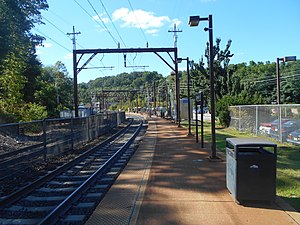Denville_(NJT_station)
Denville station
NJ Transit rail station
Denville is an active commuter railroad train station in Denville Township, Morris County, New Jersey. Located on Estling Road, the station contains three side platforms–two curved low-level platforms that service New Jersey Transit's Morristown Line, and a third that services their Montclair-Boonton Line. Both platforms on the Morristown Line contain miniature high-level platforms for handicap accessibility. Trains on both lines operate between Hoboken Terminal, New York Penn Station and Hackettstown. Heading westbound, the next station is Dover while the next station east on the Morristown Line is Mount Tabor. The next station east on the Montclair-Boonton Line is Mountain Lakes.
Railroad service in Denville began with the opening of the extension of the Morris and Essex Railroad to Rockaway from Morristown on July 4, 1848, with the extension to Dover opening just 27 days later. At the time, the line went due north the current station, running via Rockaway Township to reach Dover. As a result, the original Denville station was on Route 53 in Denville rather than its current location.[12] The Delaware, Lackawanna and Western Railroad opened its then-freight-only Boonton Branch on September 5, 1867.[13]
In 1903, the railroad eliminated the crossing between the Morris and Essex Railroad and Boonton Branches, re-designing it into a wye. At this time, the railroad built a new wooden station depot in the wye. Service via Rockaway was reduced to a branch line the railroad would discontinue on October 18, 1948. Electrification of the station came on January 22, 1931 when service between Dover and Hoboken began via Morristown. The station depot caught fire on September 21, 1991.

